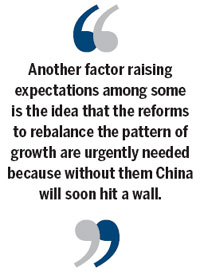High reform hopes before plenum
Updated: 2013-11-01 10:04
By Louis Kuijs and Xiaocun Tiffany Qiu (China Daily Europe)
|
|||||||||||
After several months of taking stock, new leadership prepares to unveil grand plan
All eyes are starting to shift to the Third Plenary Session of the Communist Party of China's Central Committee. Rather than concrete measures, the plenum, to be held from Nov 9, is expected to announce objectives and directions to rebalance growth toward domestic demand, consumption and services, and upgrade the industrial structure. Ever since Chinese President Xi Jinping and Premier Li Keqiang took over the CPC leadership in November last year there has been keen interest in the direction they are giving to the reforms.
In line with tradition, the new leadership has in the last 12 months or so been taking stock of the country's key challenges and the need and room for reform. The new leadership's statement of principles and directions of economic policy and reforms are meant to be approved by the Party plenum.
Expectations are high for the new leadership's reform plans for several reasons. For one, many have been wishing for reforms in various fields. In the economic and financial realm, they look forward to market-oriented reforms.
Li has advocated economic reform such as changing the pattern of growth, raising domestic demand, improving the quality of urbanization and, as announced recently, changing the role of the government in the economy.
Another factor raising expectations is the belief that the reforms to rebalance the pattern of growth are urgently needed because without them China will soon hit a wall, and that the government knows this and is acting accordingly. We (at the Royal Bank of Scotland) do not see it like that. We think that China's economy is sufficiently robust that not tackling some of the more difficult problems will not derail growth any time soon. Yet if needed, but difficult, reforms are not pushed through, China's overall reform process could become skewed. For instance, if the country maintains decent progress with necessary, easy "welfare state" types of reforms and yet cannot make progress on the difficult but essential growth and productivity enhancing rebalancing reforms, it could end up with a rebalanced but slower-growing economy.
Also, if the reforms to adjust the economic structure and the domestic financial system cannot be implemented and the government presses ahead with capital account opening, the risks of financial instability would rise, as would misallocation of capital.
So what should be expected from the plenum?

Many of the specific areas of economic reforms have been advocated and discussed for many years. Nonetheless, at this stage in the policy cycle, we do not expect many announcements on speedy implementation of reforms. Rather, we expect the leadership to present a statement with objectives and directions of reforms to rebalance the pattern of growth more toward domestic demand, consumption and services - and upgrading the industrial structure and moving up the value chain.
The broad principles are likely to be about market orientation, opening-up to and integration with the world economy, (improving the quality of) urbanization, innovation and "changing the government's management mode" (the role of the government in the economy).
We expect the political economy of reforms to play an important role in determining the relative emphasis on different areas. In line with the developments in recent years, we expect further progress in areas in which there is not much resistance, and little progress in areas where resistance is strong.
Thus, we think the leadership will set reasonably concrete principles and directions on how to move forward in areas with fairly broad agreements. This would be applicable to financial and monetary reforms, pricing and taxation of raw materials and more government spending on healthcare, education and social security.
In addition, the Party plenum will set some general objectives and principles in areas that senior leaders have emphasized but where the political economy is an obstacle to ambitious reforms. This includes the "new urbanization" drive, which calls for important but politically difficult reforms such as those of the hukou (house registration) and fiscal systems, and conversion of rural land for urban use. Despite high expectations, signs are that there is limited scope for speedy movement on the fiscal and land reforms.
Clear principles and directions of the reforms are unlikely to be spelled out for areas where the political economy is an obstacle and which have not been emphasized by senior leaders. They, according to our view, include areas such as leveling the playing field for state-owned enterprises and other companies.
This situation is not unique to China, and it does not mean resistance cannot be overcome. Other countries have faced similar problems. Internationally, and in China's own past, with resistance standing in the way of further progress and development, strong leadership at the highest political level has sometimes been employed to push through difficult reforms.
The authors are economists with The Royal Bank of Scotland.
(China Daily European Weekly 11/01/2013 page9)
Today's Top News
Premier Li seeks point of balance
Reform roadmap before key meeting
Intel leaks proved justified: Snowden
Cooperation needed in terror fight
Beijing to further boost visa-free stay
Shenzhou X crew awarded for outstanding service
US to file murder complaint against LAX shooter
China's non-manufacturing PMI rises in October
Hot Topics
Lunar probe , China growth forecasts, Emission rules get tougher, China seen through 'colored lens', International board,
Editor's Picks

|

|

|

|

|

|





